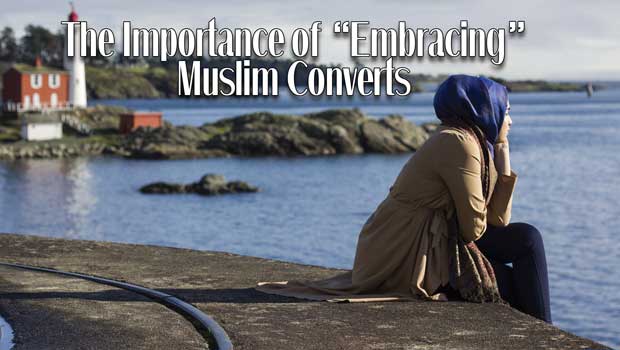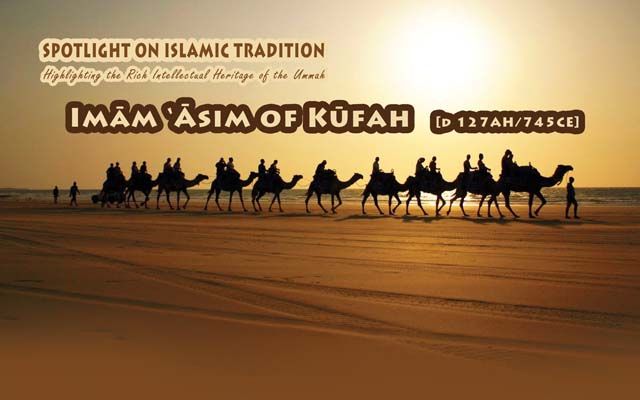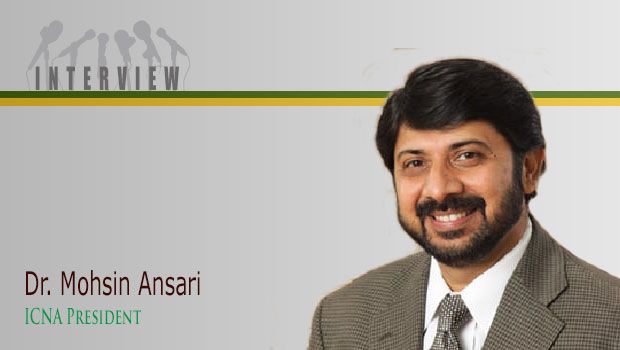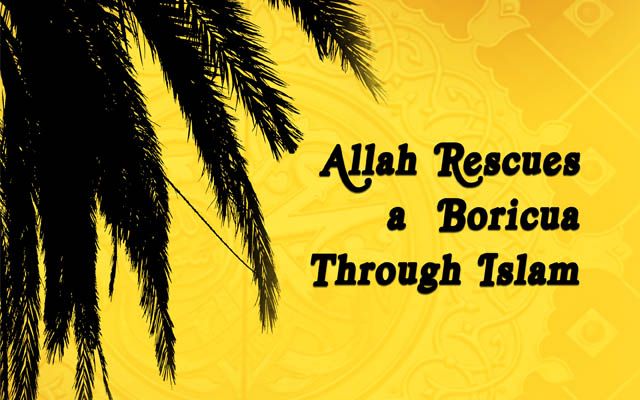Allah SWT says in the Quran, “If you had been harsh or hard-hearted with them, they would have dispersed from around you” (3:159). In this verse, Allah informs Prophet Muhammad, peace and blessings be upon him, that if he were harsh with his companions — individuals who are seen as the very best of all Muslims — they would walk away from him and Islam. Instead the Prophet (pbuh) was instructed to be lenient and merciful with them.
The Quran was revealed over a 23-year period, allowing the faith of the early Muslims to deepen and strengthen with increasing knowledge and experience. Similarly, those who embrace Islam today should be treated with patience and compassion to help them grow. They should have an environment of support and guidance in which they can trust those around them, identify with them, and develop a sense of community and family. Yet, there is a misconception that Muslim converts automatically have the strongest imaan (faith), due to the fact they chose the religion instead of being born into it. Just as in the case of the earliest Muslims, the imaan of converts today is something that needs to grow and develop over time. Embrace, a project of ICNA that has been operational for about a year, highlights this need in their mission statement: “To serve, empower, integrate, and nourish the diverse Muslim convert community by providing safe social spaces that encourage growth, shape their Islamic identity, and equip them with the knowledge they need for their lifetime journey.”
Programs Implemented by Embrace
Embrace has already implemented a number of programs to carry out this mission. The project has established weekly halaqahs (religious meeting; study circle) at two locations. These meetings are led by two imams, both converts to Islam. In fact, Embrace is managed by converts as they are better able to teach Islam to new Muslims from a perspective they can more easily identify with. Embrace leaders and teachers are also better able to understand some of the unique challenges converts face, and how to respond to and support the new converts based on their own experience of converting to Islam. The two halaqahs are growing and there are members who consistently attend, grateful for the environment these halaqahs provide, a comfortable and supportive space for them to grow as Muslims. The halaqahs are also live-streamed on Facebook every week, allowing Embrace to serve converts who cannot attend that day, as well as those who are not local.
During the halaqahs, open and engaging discussion is encouraged. Members are warmly welcomed to share their views and experiences, and all questions are answered. Personal development, along with spiritual growth, are encouraged, as part of the Embrace vision is helping converts cultivate leadership skills and eventually take on leadership roles in the Islamic movement in the U.S. Embrace strives to educate new Muslims about the religion, free of any cultural or sectarian slant or bias, and helping converts stay clear of misconceptions about Islam and/or Muslims by following the Quran and the sunnah (example) of Prophet Muhammad (pbuh). Additionally, Embrace focuses on the community aspect of Islam. Brotherhood/sisterhood is an essential component of Allah’s deen, and Embrace strives to provide an authentic sense of community, a place to strengthen the bonds of shared belief and fellowship.
With this aim, potluck dinners are held after the halaqah the third week of each month. Seasonal potlucks are also held outside of the scheduled halaqahs, and members are requested to bring their families along for the fun. Members of Embrace are affectionately referred to as the “Embrace family,” promoting a sense of belonging, love, and trust. This is important as many converts experience a strain in family relationships after they accept Islam. Some become completely estranged from family members. Embrace can thus function as a new family, providing assurance that the convert is not alone as they continue on their journey of faith.
Embrace has also hosted 18 iftars (meals to break the daily fast) during the month of Ramadan. These iftars were either held at the halaqahs or at the home of one of the Embrace members. For Eid-ul-Fitr (celebration at the end of Ramadan), Embrace hosted a dinner with over 100 converts and their families attending and celebrating together. This is especially important as Ramadan and Eid can be the loneliest times for converts. Muslims enjoy daily iftars and celebrate Eid with their families. Converts typically have no Muslim family to celebrate these occasions with. Many Embrace members are so appreciative for these programs; for some, this was the first Ramadan and Eid during which they did not feel alone.
Embrace’s Plans for the Future
Embrace is still in a developmental stage and has many plans for the future. One future program will be “Pass the Mic” sessions. The aim is to give converts an opportunity to voice concerns, difficulties, and ideas. The inspiration for this program came from the 3rd Annual Converts Conference in the Dallas/Fort Worth area in April of this year. More than one hundred converts attended, and it has become apparent that their voices need to be heard, as they best know what challenges they face and difficulties they experience as converts.
Another planned project will be monthly community service sessions. Muslims must be a benefit to any society to which they belong and serving others in the larger community breaks down negative stereotypes about Islam and Muslims, helping to form a more positive perception of the religion and its followers in the minds of fellow Americans. Embrace is, therefore, working towards the development of a social service center for the more impoverished and neglected areas in the Dallas/Fort Worth area. It is envisioned that the center will provide basic skills training, personal development opportunities, job referrals, and other services.
In addition to programs geared to community/fellowship or service to others, Embrace recognizes the need for an educational program. This project will offer Islam 101 classes to teach converts the basics of deen. Also under consideration is a mentorship program in which veteran members will be trained to teach and support new Muslims in their journey, step-by-step. Eventually, Embrace wants to conduct cultural and ethnic sensitivity training for converts as well as the greater Muslim community. As Allah SWT tells us in the Quran, “O humankind! We created you from a male and a female and made you into nations and tribes that you may know one another. Verily the most honored of you in the sight of Allah is the most righteous of you. And Allah has full knowledge and is well acquainted [with all things]” (49:13). It is so important that Muslims, who make up the greatest diversity of ethnicities and cultures around the world, interact with one another in the most respectful and caring way. The diversity is a strength and a resource, but only if Muslims take seriously the challenge of fostering awareness, respect, and inclusion.
Challenges and Potentials
Converts too often feel like outsiders at the Masjid, especially if there is a particular ethnic and cultural influence that pervades the atmosphere, and the convert feels surrounded by individuals speaking a different language and practicing cultural norms different from what he or she is used to. So one challenge Embrace faces is that many converts do not attend or participate in mosque activities. Alternative ways must be found to reach out to them. Another issue is that local Muslim communities often do not recognize the importance of a support system for converts, or do not see that as high on their priority list. An objective of Embrace is to educate local communities about this, conveying to them the imperative responsibility of providing a support system for converts in their community. By Allah’s will, Embrace will continue to grow, helping to guide new Muslims along the path they have chosen, deepening their faith, increasing their knowledge, and cultivating attributes of an Islamic character and personality. Many have potential to eventually assume the role of leaders in our communities.
African-American Muslims have long been born and raised in this country. Second and third generation Muslims, those whose parents and/or grandparents are immigrants from various nations, have in more recent times been born and raised in the U.S. Joining these two groups are the converts, citizens who are Caucasian, African American, Hispanic, and others. This is a beautiful tapestry of believers, dedicated to truth, social justice, and a community of caring. Islam is meant for all of mankind, regardless of where one is from. ICNA will continue striving to transform Islam in America into a resource of positivity. Embrace can act as the perfect vanguard in bringing the converts fully into the fold and fostering their potential contributions to both the Muslim community and the American community at large.






